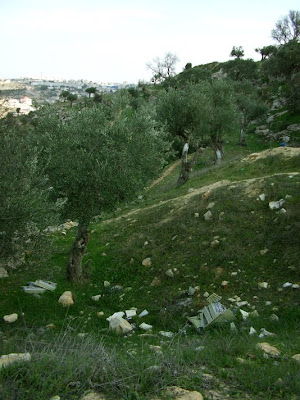.
The last days we have had a group on visit from the Young Christian Democrats (KrfU) in Norway. At the moment they are in Israel, as they want to see and hear from both sides. Among the places we visited while they were here, was a valley close to the town Beit Jala. This valley has been annexed to Jerusalem by Israel. Baha, one of the empolyees at Joint Advocacy Initiative, where I volunteer, took us to a viewpoint over the valley. On both sides of us we could see olive trees with white marks, designating the planned route of the wall. When it is built, it will disconnect the valley from Beit Jala.

Notice the white marks on the trees, showing where the wall will be built.
Baha to the right and Abed in the middle.
States have boundaries. But how absurd is not a boundary that is changed by one side against the will of the other, a boundary that lets Israelis settle on the Palestinian side, while refugees can not cross it the opposite way, in order to return to their homes?
.
The last days we have had a group on visit from the Young Christian Democrats (KrfU) in Norway. At the moment they are in Israel, as they want to see and hear from both sides. Among the places we visited while they were here, was a valley close to the town Beit Jala. This valley has been annexed to Jerusalem by Israel. Baha, one of the empolyees at Joint Advocacy Initiative, where I volunteer, took us to a viewpoint over the valley. On both sides of us we could see olive trees with white marks, designating the planned route of the wall. When it is built, it will disconnect the valley from Beit Jala.

Notice the white marks on the trees, showing where the wall will be built.
This is not the first time Israel has changed the city boundaries of Jerusalem. When East Jerusalem was occupied and unilaterally annexed after the six days' war in 1967 (unilaterally annexation is prohibited by international law), they did not only take the six square kilometers which had previously comprised East Jerusalem, but also 64 square kilometers of the West Bank. The wall is again changing the city boundaries. On the one hand it is leaving out areas of East Jerusalem where Palestinians are living, so that 55 000 Palestinians will no longer be Jerusalem residents when the wall is finished. On the other hand it will include three Israeli settlements on the West Bank and big areas of undeveloped land. If you want to read more about this, see the website of the Israeli human rights organisation BTselem, or the Israeli organisation Ir-Amim, which is working especially with Jerusalem.
We went down into the valley to visit Abed, a Palestinian who is owning land in what used to be the West Bank and is now Israel. Palestinians need a permit from Israeli authorities or to hold a residency of Jerusalem in order to be allowed inside the city. Since Abed has neither, he is now staying illegaly in his own land.
Baha to the right and Abed in the middle.
States have boundaries. But how absurd is not a boundary that is changed by one side against the will of the other, a boundary that lets Israelis settle on the Palestinian side, while refugees can not cross it the opposite way, in order to return to their homes?
.


No comments:
Post a Comment